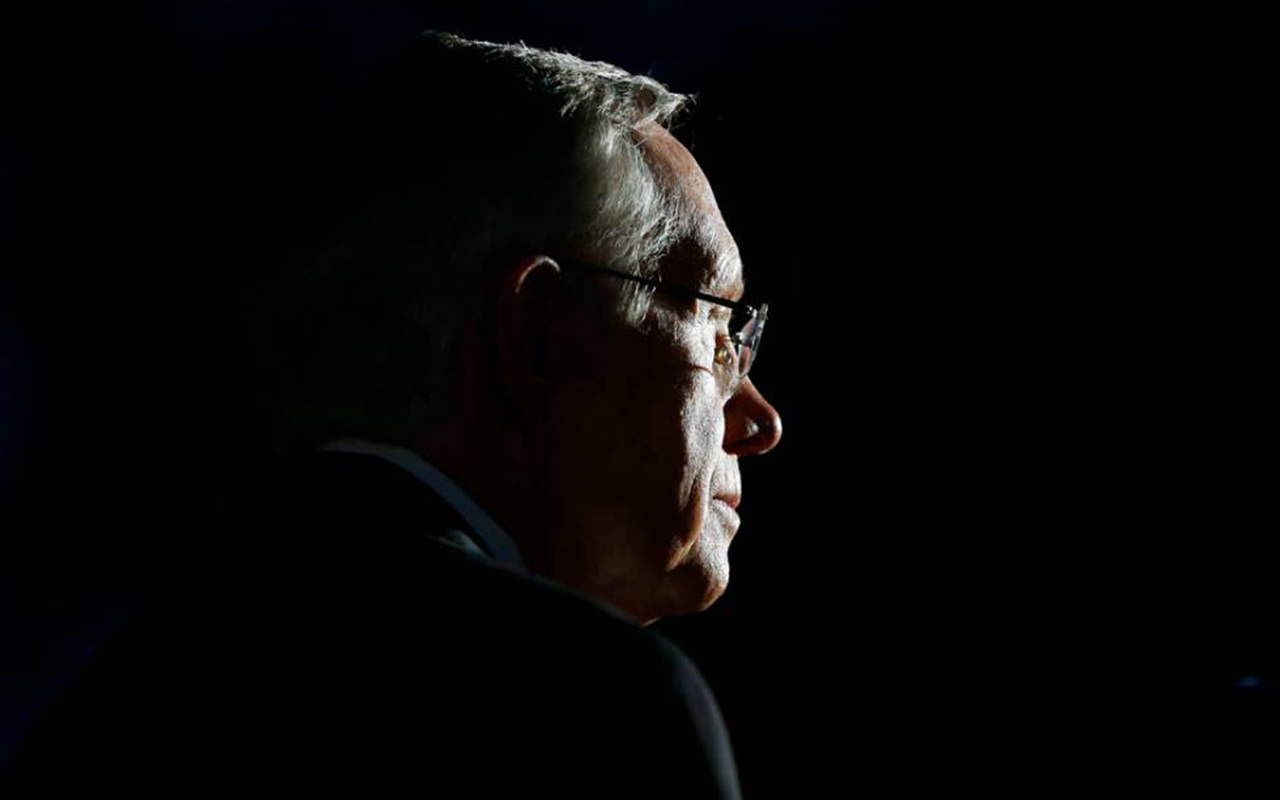President Joe Biden, a longtime colleague in the Senate, took to Twitter, calling Reid a dear friend and “a giant of our history.”
“A son of Searchlight, Nevada, Harry never forgot his humble roots,” Biden wrote. “A boxer, he never gave up a fight. A great American, he looked at challenges and believed it was within our capacity to do good — to do right.”.
Reid underwent surgery at Johns Hopkins Cancer Center in Baltimore in May 2018 to remove a tumor from his pancreas, according to the family. He underwent chemotherapy following the successful removal of the tumor. Reid said in 2020 that the cancer was in remission.
Following his treatments, Reid again was a behind-the-scenes force in the state’s Democratic Party. After the 2020 presidential caucuses, Reid’s declaration that the state should shift to a primary opened a floodgate of other officials joining that call.
The 2021 Legislature ultimately passed Assembly Bill 126, which not only switched Nevada from a caucus state to a primary state, but also fulfilled another longtime Reid goal, moving ahead of Iowa and New Hampshire as the first state to vote for president in the nation.
He was rewarded in February 2021 for his service to Nevada by the Clark County Commission, which took the first step in honoring him by rechristening the Las Vegas airport, previously named after the late-Sen. Pat McCarran, the Harry Reid International Airport.
“It is with humility that I express my appreciation for the recognition today,” Reid said of the honor.
A taciturn figure with a pugnacious demeanor, Reid symbolized the hardscrabble state of his birth.
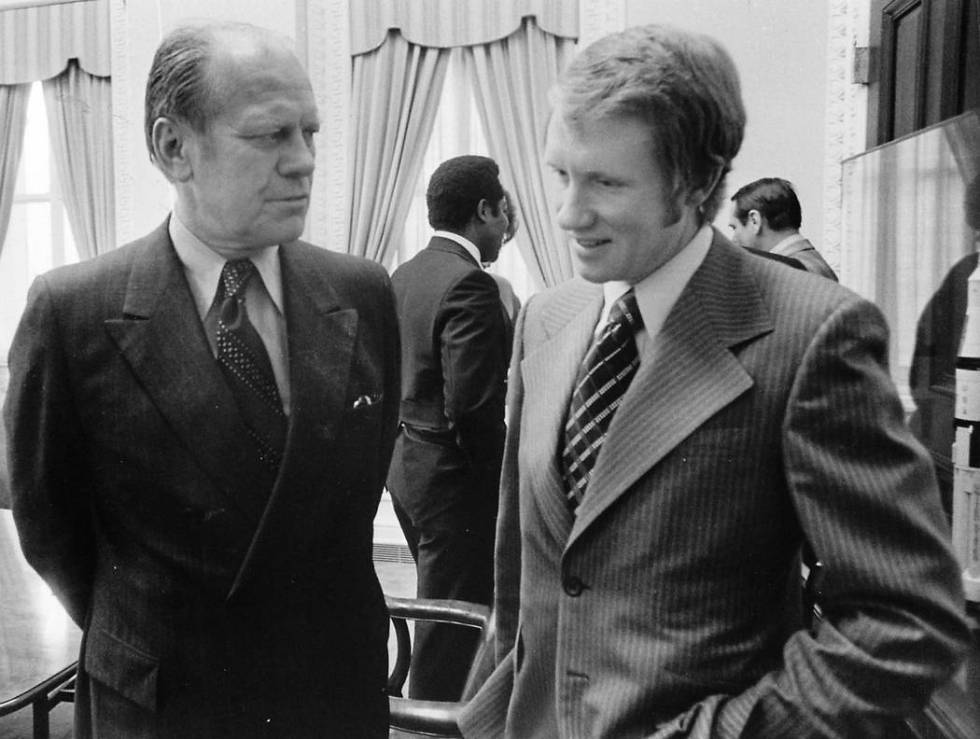
Reid was born on Dec. 2, 1939, in Searchlight and grew up in the sunbaked desert town, about 60 miles south of Las Vegas, the son of a miner who killed himself. The town had 13 brothels, gold mines and nothing else when Reid grew up.
His mother washed laundry at one of the brothels that had a pool where Reid learned how to swim.
“I think everyone should grow up in a town with brothels,” Reid joked during an interview with the Las Vegas Review-Journal in his Capitol office before leaving in 2016.
During his tenure, Reid had advocated outlawing prostitution in Nevada, which still exists legally in less populous counties in the state.
Attending high school in Henderson, Reid met Mike O’Callaghan, a Korean War vet and future governor. O’Callaghan served as a mentor to Reid, and would later play a key role at various points in his career and political life.
O’Callaghan coached Reid and taught him to box, a skill that led Reid to become an amateur boxer.
Following high school, Reid attended and graduated from Utah State University.
Reid went to Washington and served as a Capitol Hill police officer while attending George Washington University Law School at night, a time in his life he later recalled as being a grind. Upon graduation, he returned to Nevada and practiced law, serving as the city attorney of Henderson while working for the firm of Singleton, DeLanoy and Jemison.
“I would take cases no one else would take,” Reid recalled in a 2017 interview with the UNLV Law magazine.
He represented a cocktail waitress charged with writing bad checks, and called a corporate officer for the grocery store chain accusing her to the witness stand. He represented a woman misdiagnosed and disregarded by a series of doctors. And, he recalled with some pride, he sued an apartment complex after it had evicted his client, who worked as a prostitute.
He won all of those cases.
Political career
Reid started his political career by winning election to the Nevada Assembly in 1968, alongside another Nevadan destined to become famous, Richard Bryan. Together, they became known as the “gold dust twins.”
From there, Reid was tapped to run for lieutenant governor by O’Callaghan, who was running for governor in 1970. Reid served one term in that office before deciding to mount a campaign for U.S. Senate, a decision that proved disastrous and nearly ended his political career.
Reid was vying against popular Paul Laxalt to replace Alan Bible in the Senate, and after a spirited campaign, he lost by fewer than 700 votes. Suddenly out of political office, and trying to resurrect his political career, Reid turned around and immediately ran for Las Vegas mayor in the off-year election of 1975, losing again to Bill Briare.
He took a break from politics after the double losses, and may never have returned. But O’Callaghan intervened in his life once again, appointing him as chairman of the Nevada Gaming Commission.
While chairman of the Gaming Commission, Reid worked with the FBI on a sting operation that captured businessman Jack Gordon trying to bribe Reid with $12,000 to approve new casino games. Reid launched himself across his desk and tried to strangle Gordon. “You son of a bitch, you tried to bribe me,” Reid said, knowing he was being recorded by the FBI.
Reid, in a memoir, said his wife later found a wire in the family station wagon that was rigged to detonate the gas tank. He blamed Gordon.
Director Martin Scorsese included a gaming commissioner character in his movie “Casino” that was inspired by a composite of people, including Reid, and played by Dick Smothers.
In 1982, Reid easily won a newly created congressional seat based in Las Vegas, and headed back to Washington. He was re-elected in 1984.
But in 1986, Reid once again sought the U.S. Senate seat he had tried to win in 1974, after Laxalt chose to retire. He battled ex-Congressman Jim Santini, a Democrat who had re-registered as a Republican, and won by a comfortable margin.
In 1992, Reid won the Democratic primary against a field of five candidates, one of whom was running under the name “God Almighty.” But the almighty would prove not to be his toughest opponent.
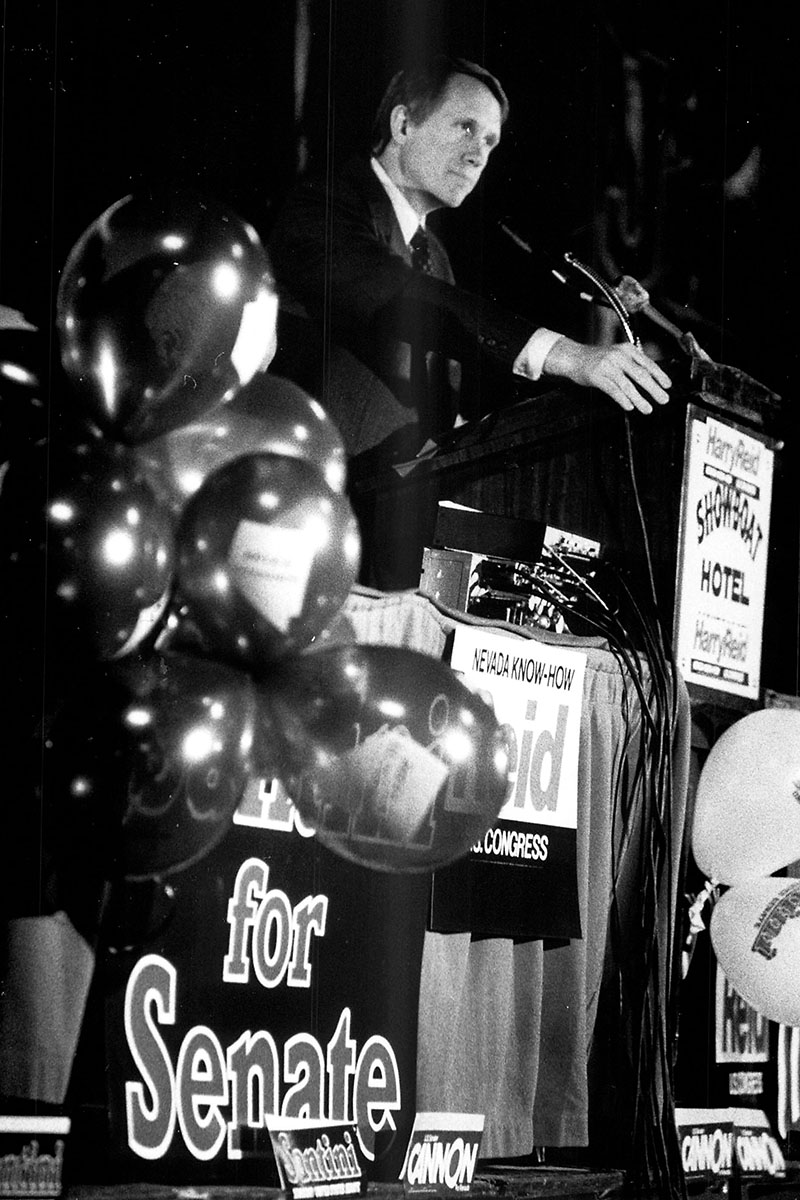 U.S. senate candidate Harry Reid at a campaign stop at the Showboat Hotel in Las Vegas in March 27, 1982. (File Photo)
U.S. senate candidate Harry Reid at a campaign stop at the Showboat Hotel in Las Vegas in March 27, 1982. (File Photo)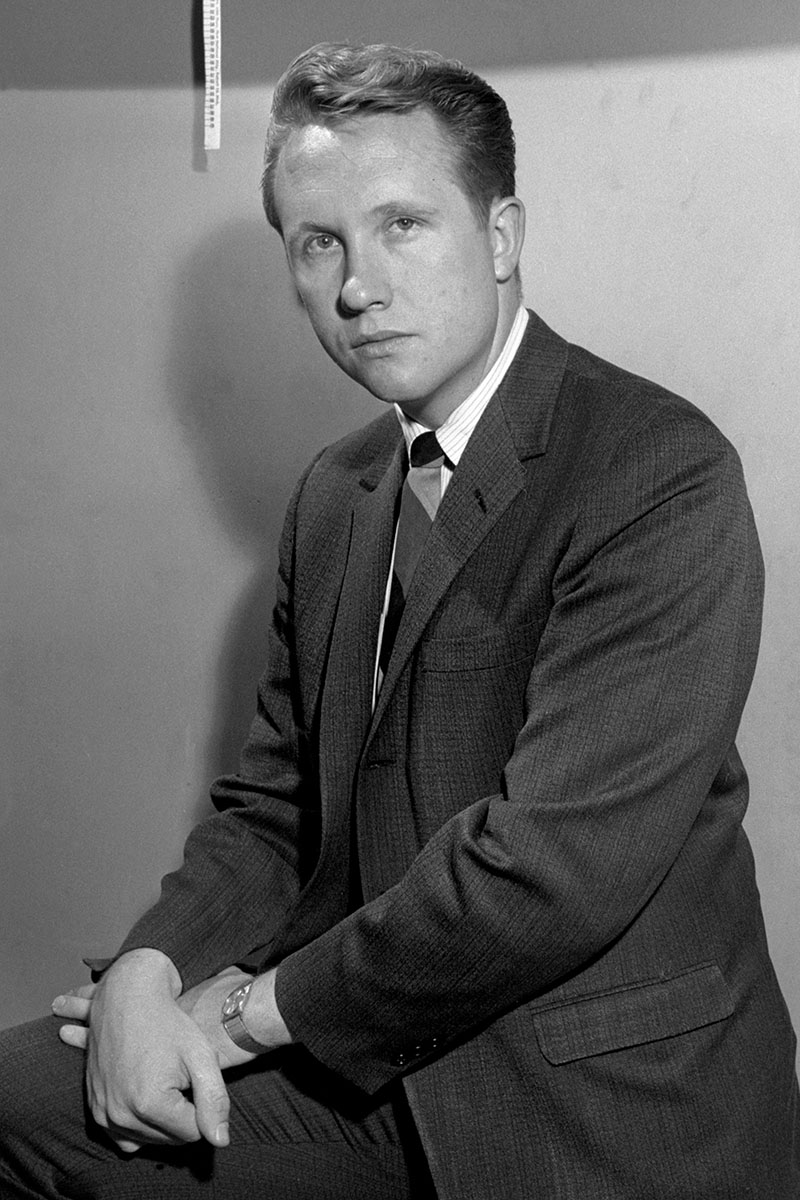 Attorney Harry Reid, 26, candidate for the Board of Trustees of Southern Nevada Memorial Hospital, poses for a campaign mug at the Las Vegas Review-Journal. Reid would later climb the political ladder to become the U.S. Senate Majority Leader in 2005. (File Photo)
Attorney Harry Reid, 26, candidate for the Board of Trustees of Southern Nevada Memorial Hospital, poses for a campaign mug at the Las Vegas Review-Journal. Reid would later climb the political ladder to become the U.S. Senate Majority Leader in 2005. (File Photo)Near-political-death experience
That came six years later, in a race that once again nearly ended Reid’s political career. He faced off with Congressman John Ensign in a bitter race that was decided by just 401 votes statewide out of a total of nearly 436,000 cast.
It was the close call with Ensign that prompted Reid to take a direct hand in running the Nevada Democratic Party, seeding the operation with handpicked operatives to ensure that the party would be an asset to his re-elections. This was the genesis of what came to be known as the “Reid machine,” a network of operatives in the state and beyond that excelled at voter registration and turnout.
Reid also made friends with Ensign following his near political death, and when Ensign won election to the Senate seat of the retiring Richard Bryan in 2000, the two forged a “non-aggression PAC” that saw Reid give scant support to the Democratic nominee, attorney Ed Bernstein. Reid and Ensign remained friends throughout their time in the Senate.
Despite his close call in 1998, Reid only drew a token opponent in 2004 in the person of Richard Ziser, a conservative activist best known for passing the anti-gay marriage constitutional amendment in 2000 and 2002.
Reid later remarked it was the only race in which he never met his opponent on the campaign trail, at a debate or at a candidate forum. Ziser proved to be an ineffective candidate, even losing to “none of these candidates” in seven rural counties in the GOP primary. Reid easily won the general election with 61 percent of the vote.
Rising in leadership
But Reid’s easy ride in 2004 was belied by Democratic politics in Washington: the Democratic minority leader in the Senate, Tom Daschle of South Dakota, was defeated by Rep. John Thune. That thrust Reid — then the minority whip, known for carrying a card in his jacket pocket on which he’d inscribe the needs of caucus members — into the leadership of Senate Democrats.
As leader, Reid later said, he had two constituencies, his Nevada voters and his Democratic senators. It was his attention to the latter (and efforts on their behalf) that would earn him the ire of Republicans nationally and at home.
Reid’s outrageous fortune drew slings and arrows. Conservative radio host Rush Limbaugh dubbed him “Dingy Harry” because of his low-profile style. In Nevada, a common refrain was that Reid had “changed” when he became the most powerful Nevadan ever elected to federal office.
That attention and the publicity that attended it made Reid the most vulnerable Senate incumbent in his 2010 re-election, and a tempting Republican target. But the Reid machine was firing on all cylinders that year.
First, Reid worked hard to select his opponent. Fearing the telegenic hotelier Sue Lowden, a former KLAS-TV, Channel 8 news anchor, Reid’s campaign pounced on an unforced error. Lowden allowed on the trail that in days past, people would barter with doctors for health care, trading services or goods for treatment.
With the health care debate raging (Reid had been instrumental in passing Obama’s signature Affordable Care Act in 2011), Lowden was denounced as advocating “chickens for checkups.” A Democratic staffer brought a live goat to a Lowden campaign office, asking where she could get medical help. Lowden stubbornly refused to defuse the issue, and ended up losing the Republican primary to Republican former Assemblywoman Sharron Angle.
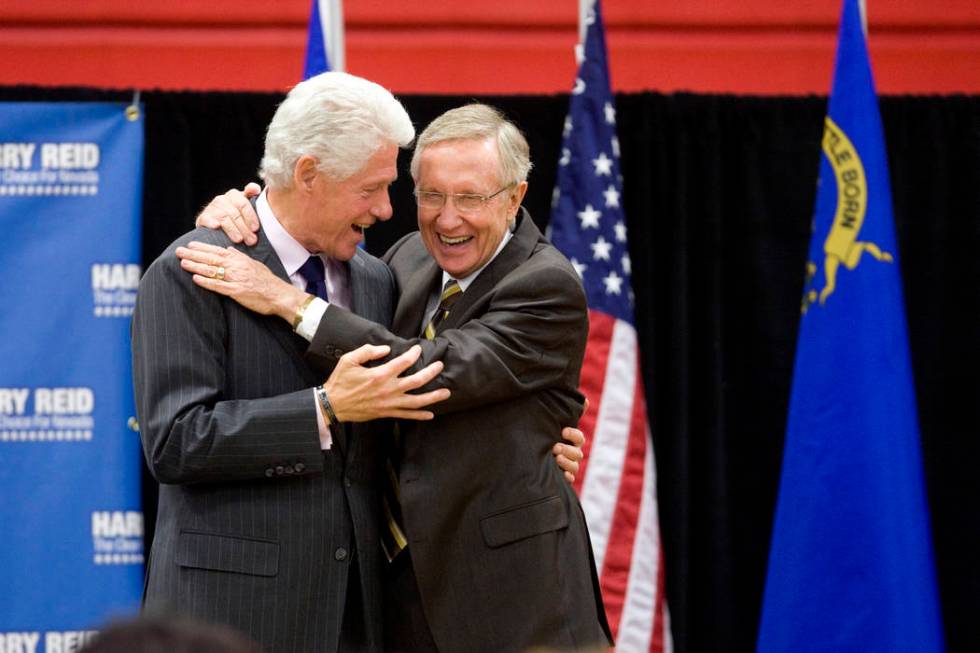
Republicans for Reid
Angle was a back-bencher in the Assembly, often casting votes at odds with the entire body (it was an outcome known as 41-t0-Angle among insiders).
She had a penchant for blurting out ready-made campaign attacks, telling a radio interviewer that “Second Amendment remedies” might be necessary to get the country back on track, or comparing herself to Moses, St. Paul and Jesus Christ in another.
Angle told a class of Hispanic students that “some of you look a little bit Asian to me” and aired an ugly ad depicting Hispanic toughs crossing the border. She literally ran away from reporters trying to ask her questions, and once deployed a decoy to distract reporters while she scurried away from an event.
At their one debate, on KLVX-TV, Channel 10, Angle hit her high-water mark, dropping the line “man up, Harry Reid.” Reid, nonplussed, continued the debate as though it was a normal exchange.
What was not normal was the fact that Reid’s eldest son, Rory, was running for governor on the same ballot. (Reid had indicated he may retire, but decided against it, after Rory Reid was the de facto Democratic nominee.) Given the option of the two Reids, many voters opted to go with Harry Reid, who despite his negative reputation at least had his leadership spot, valuable to a small state such as Nevada. Republican adman Sig Rogich even formed a group, “Republicans for Reid,” that urged voters of all parties not to give up Reid’s Washington influence.
Although most public polls, including those commissioned by the Review-Journal, had Angle winning by about 2 percentage points, Reid’s internal pollster, Mark Mellman, saw it differently. A Reid operative told a reporter on background three weeks before the election that Reid would win by 6 percentage points. His final margin of victory: 5.6 points.
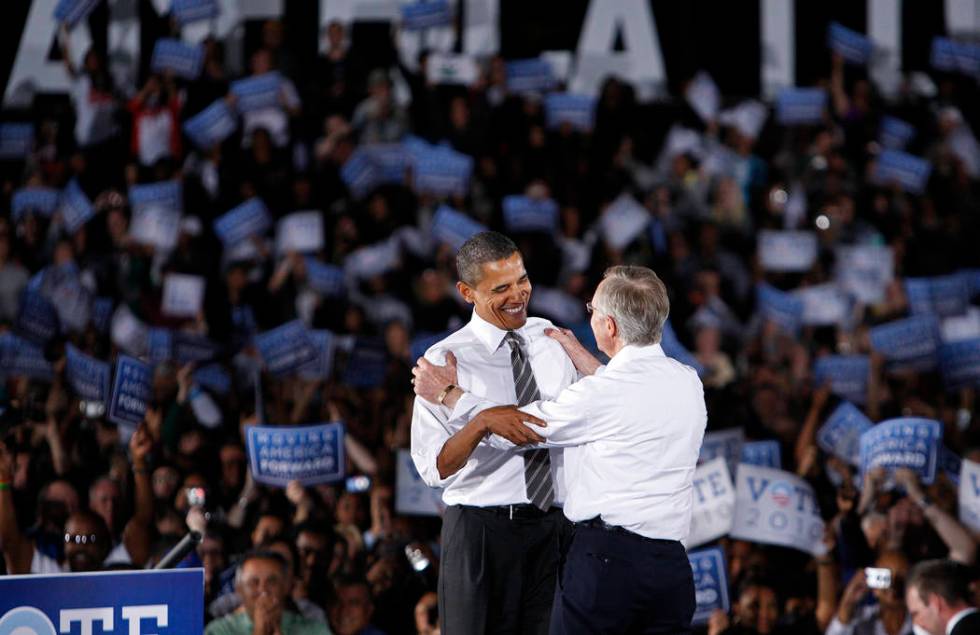
Three things
Reid will be most remembered in his Senate career for three things: stealing the majority through a recruitment, passing the Affordable Care Act by the thinnest of margins, and exercising the “nuclear option” of modifying the Senate’s infamous filibuster rule.
After the 2000 elections, the Senate was split evenly between Republicans and Democrats, with then-Vice President Dick Cheney able to break tie votes in his role as president of the Senate.
But Reid, then the minority whip, began seeking out potential party-switchers, any one of whom would throw control of the chamber to the Democrats. He courted Jim Jeffords openly on the Senate floor, and offered a prize that appealed to Jeffords: the chairmanship of the Senate Environment and Public Works committee, which Reid was in line to receive if Democrats took over. (Jeffords at the time was chairman of the Health, Education, Labor and Pensions Committee, a post he would lose by stepping away from the Republicans.)
In May 2001, Jeffords announced he was switching his registration from Republican to independent and would caucus with the Democrats for organizational purposes. The move put Daschle in charge as majority leader, elevated Reid to majority whip and put an obstacle in front of newly elected President George W. Bush.
It was a major coup for Democrats, the first time party control of the Senate had switched because of a defection rather than an election. The switch was only temporary, however. Republicans regained the Senate in 2002.
Reid’s mastery of the process was never more on display than after Obama won the White House in 2008, and decided to pursue his No. 1 priority — health care, in the form of the Affordable Care Act. The measure was unpopular with Republicans from the start, and they threatened to filibuster any attempt to pass that bill that contained a mandate to purchase health insurance.
Reid, who had ascended to the majority leader’s post, had to scrape for every Democratic vote he could muster, but was two votes shy of the 60 needed to end the filibuster and proceed to a vote. He got one after the long recount in the 2008 Minnesota Senate election was decided for Al Franken and another when longtime Pennsylvania Sen. Arlen Specter switched parties to become a Democrat in 2009, ahead of an expected tough re-election in 2010.
The Senate passed the Affordable Care Act in December 2009, with the bare 60 votes needed. But the future of the act was thrown into doubt when Scott Brown won a special election in Massachusetts to replace the late Sen. Ted Kennedy, who had voted for the act.
With just 59 votes, Reid knew he couldn’t overcome another filibuster. In fact, Brown had campaigned in Massachusetts — a state that already had a health care mandate — as the 41st Republican vote against the Affordable Care Act.
Instead the House passed the Senate’s bill without changes, so an amended bill would not have to return to the Senate at all, while budget-related changes were made in another bill not subject to filibuster. The high-wire act and lengthy negotiations Reid oversaw, between Democrats and Republicans, resulted in the most significant change to health care law since the passage of Medicare in 1966.
Going nuclear
In Obama’s second term, Reid struggled against the Republican minority’s filibusters of judicial nominations, at one point producing a chart showing more filibusters in his Senate than in any previous majority leader’s tenure. Although some called for doing away with the filibuster altogether, Reid charted a more conservative course.
In October 2013, he changed the rules to allow approval of U.S. District Court judges, appellate court judges and administration appointees with a simple majority. He specifically excluded U.S. Supreme Court nominees from the change, although Republicans would later cite Reid’s precedent in 2018 when they lowered the bar to a simple majority for high court nominees under President Donald Trump.
Reid’s move — dubbed “the nuclear option” — came only after months of trying to work around the filibuster proved cumbersome.
“The American people believe Congress is broken. The American people believe the Senate is broken. And I believe they are right,” Reid said on the Senate floor when the change was adopted. “The need for change is so very, very obvious.”
After his retirement, Reid would advocate for doing away with the filibuster for regular legislation as well, saying President Joe Biden should give Republicans a matter of weeks to show they were willing to cooperate before making the change.
Reid fought health issues toward the end of his political career. In 2005, he suffered a transient ischemic attack, or TIA, a sort of mini-stroke that didn’t have lasting effects. Ten years later, on New Year’s Day 2015, Reid suffered an injury that cost him sight in his right eye in a mishap with an exercise band in the bathroom of his Henderson home. He later sued the manufacturers of the bands but lost.
Ultimately, Reid opted against running for office in 2016, instead tapping former Nevada Attorney General Catherine Cortez Masto for the job. She won election to Reid’s seat.
Following his retirement from the Senate, Reid moved back to Nevada and established a think tank at UNLV with former Republican House Speaker John Boehner of Ohio.
Reid was working at UNLV in 2018 when a medical screening discovered a tumor on his pancreas that prompted the surgery and chemotherapy.
After treatment, Reid worked for MGM while continuing to guide his party in Nevada and Washington.
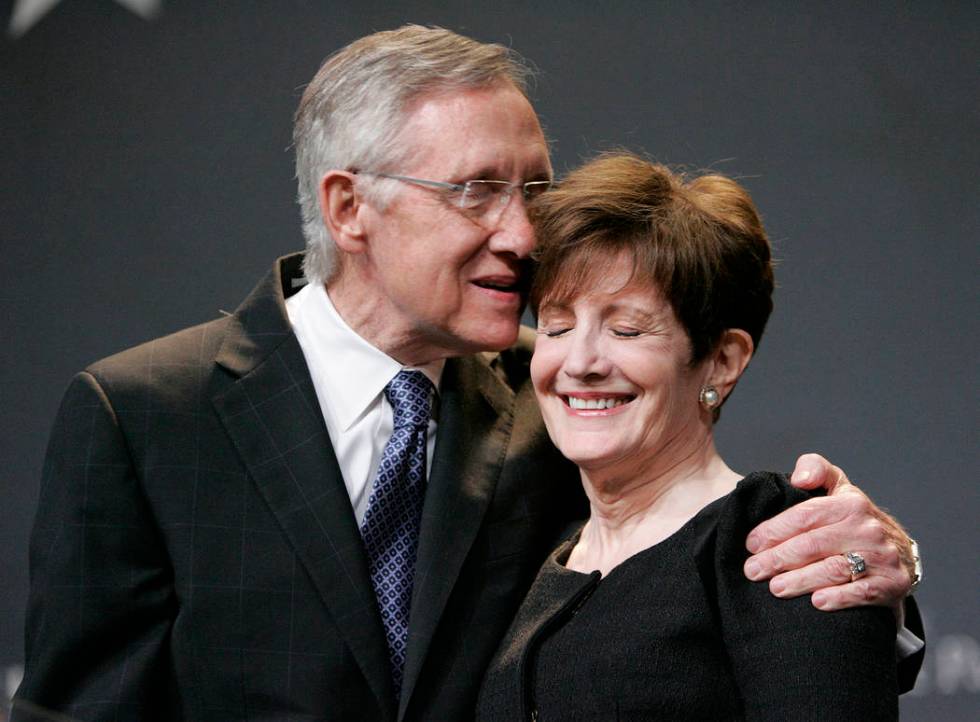
Humble beginnings
Reid’s humble beginnings in Searchlight — later the stuff of Senate legend — shaped his political and personal philosophies throughout his life.
“I consider it a wonderful privilege, a blessing in my life, that I have been able to serve in the Senate with my background, where I came from, to be able to be a senator, let alone be the leader of the Senate, for as long as I have been,” Reid said in a 2016 interview.
Having grown up poor, Reid nursed a longtime resentment of people who had inherited wealth and whom he thought insensitive to the needs of the poor. This was true even after Reid — after a career in law and in the Senate — grew wealthy enough to live in a condo at the Ritz Carlton in Washington, D.C.
Nowhere was this more evident than in the presidential campaign of 2012, where Reid took aim at Republican nominee Mitt Romney, a former Massachusetts governor and, like Reid, a member of the Church of Jesus Christ of Latter-day Saints.
Reid boldly charged that Romney, who had led a hedge fund and who had been accused by even fellow Republican Newt Gingrich of destroying companies and throwing Americans out of work, paid no taxes himself in the decade before he ran for president.
Romney denied the allegation, which later proved to be entirely untrue. Confronted about the allegation at an event, Reid said Romney could simply release his tax returns and prove the allegation false. Asked if he wasn’t using the tactics of the 1950s-era blacklist, Reid gamely replied that blacklist members could never clear their names, while Romney could easily clear his by releasing his returns.
Eventually, Romney did, and the returns showed he had paid millions in taxes during some of the years in question. After Romney lost the election, Reid was asked about his charge by CNN’s Dana Bash. Adopting a wry smile, Reid replied, “He didn’t win, did he?”
It was that kind of political pugilism that gave Reid his reputation as an irascible leader with the quick temper and a cutting tongue who lashed out at adversaries and friends alike. He rarely socialized in Washington, content to be with his family and wife, Landra, with whom he eloped and married in 1959.
He once called then-President George W. Bush a “loser” and a “liar.” (Bush had promised on the campaign trail to decide the Yucca Mountain nuclear repository question based on “sound science,” but authorized the dump after he was elected.)
Reid claimed Senate Republican Leader Mitch McConnell was “classless” and denounced President-elect Donald Trump as “a sexual predator who lost the popular vote.”
Reid later apologized for calling Bush a loser, but not a liar.

Speaking his mind
But the intemperate name-calling became a character trait — and one disdained by Republicans.
McConnell wrote in his memoir that Reid had a “Dr. Jekyll and Mr. Hyde personality” and was rhetorically challenged. “If a scalpel will work, he picks up a meat ax,” McConnell said.
The outbursts grew more commonplace in the hardened partisan atmosphere in the Senate, catching even loyal staffers by surprise.
“As a staffer you were terrified, because you never knew exactly what he was going to say. Sometimes it worked out well and sometimes it didn’t,” said Jim Manley, a former chief spokesman for Reid.
“He had an amazing ability to speak his mind,” Manley added.
That was just as true of Democrats as it was for Republicans. According to the book “Game Change,” Reid once said that Obama could be successful in politics in part because he was “light-skinned” and had “no Negro dialect, unless he wanted to have one.”
After the news broke, Reid apologized for his remarks, telling CNN, “I deeply regret using such a poor choice of words.”
“I sincerely apologize for offending any and all Americans, especially African Americans, for my improper comments,” Reid added.
In fact, Reid was one of the first people to suggest to Obama — then a first-term U.S. senator from Illinois — that he should run for president. Reid’s judgment of Obama’s political skills proved to be right on, and led to a history-making presidency.
While all senators consider themselves to be presidential timber, Reid never had White House ambitions, said Manley, who worked for the late-Sen. Ted Kennedy, D-Mass., during his decades on Capitol Hill.
“He was the only senator in my 20 years that didn’t feel that way,” Manley said of Reid’s lack of presidential ambition. “He was smart enough to realize his skills were best left in the Senate.”
Reid used those skills to the benefit of his state.
Impacts on Nevada
Locally, Reid was credited with saving the development of CityCenter after it was imperiled by the great recession, and capital improvements projects that helped buffer Las Vegas during the economic downturn, recession and housing bust in 2008.
Less conspicuously, Reid also helped the Nevada mining industry by preventing any attempt to impose greater federal royalties on gold mined in the state. Ironically, Reid consistently lost elections in rural Nevada, where most mining operations were located.
Reid also is credited with pressing the Obama administration to create three national monuments, Tule Springs Fossil Beds, Gold Butte, and Basin and Range.
Reid’s advocacy for Nevada to move up on the presidential nominating calendar was prompted by his belief that Nevada’s diversity better reflected the American population at large than either Iowa or New Hampshire, small and relatively white states.
“I don’t think it matters what happens in Iowa or New Hampshire because those states are not representative of the country anymore,” said Reid in 2019, according to NBC News.
At the tail end of his Senate career — and into his retirement — Reid’s role in pressuring the government to release information about UFOs came to light. Reid credited Channel 8 reporter George Knapp, an expert on the mysterious phenomenon, with sparking his interest in the subject.
And while still in the Senate, Reid was able to secure funding for a congressional study of what the government alternatively called “unidentified aerial phenomenon,” although he admitted he risked being considered a “kook” for asking for the probe.
“I was told early by friends to stay the hell away from this,” Reid told the Review-Journal in a June interview.
But Reid said he ignored their advice, and was glad he did, given the anticipation that awaited the public release of the Defense Department’s investigation into the subject.
“People are tremendously interested in this now,” Reid said.
Reid is survived by his wife, Landra, his children Rory, Lana Reid Barringer, Leif, Josh and Key, 19 grandchildren and one great granddaughter. The family said funeral arrangements would be announced later.
Contact Gary Martin at gmartin@reviewjournal.com or 202-662-7390. Follow @garymartindc on Twitter. Review-Journal Politics and Government Editor Steve Sebelius contributed to this story.



